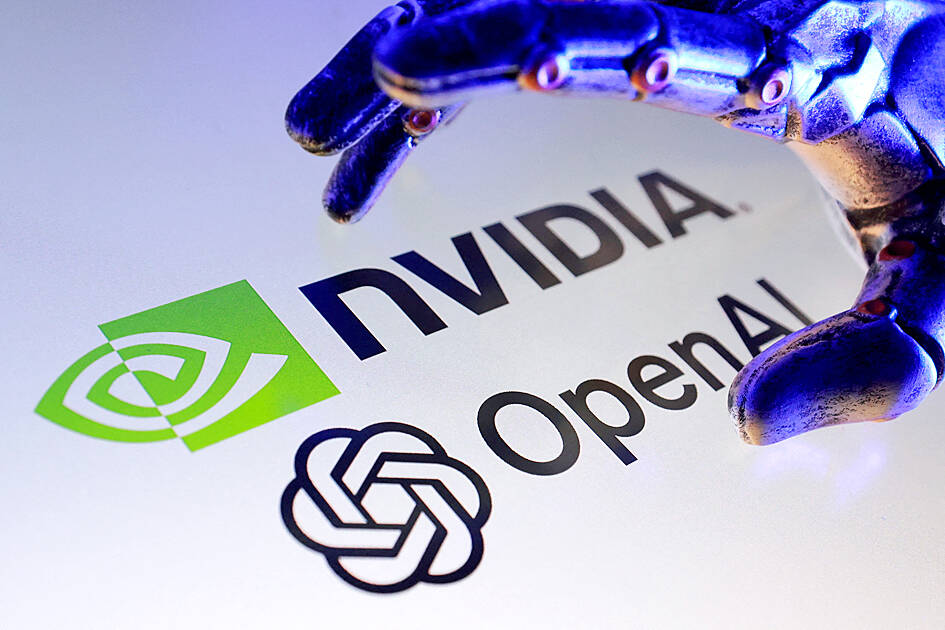Nvidia Corp is to invest as much as US$100 billion in OpenAI to support new data centers and other artificial intelligence (AI) infrastructure, a blockbuster deal that underscores booming demand for AI tools like ChatGPT and the computing power needed to make them run.
The companies announced the agreement on Monday, saying they had signed a letter of intent for a strategic deal.
The investment is meant to help OpenAI build data centers with a capacity of at least 10 gigawatts — equipped with Nvidia’s advanced chips to train and deploy AI models.

Photo: Reuters
The money would be provided in stages, with the first US$10 billion coming when the deal is signed, people familiar with the matter said.
Nvidia is making the investment in cash and would receive OpenAI equity as part of the deal, the people said.
Further increments would follow when each gigawatt of computing power is deployed, they added.
“This investment and infrastructure partnership mark the next leap forward — deploying 10 gigawatts to power the next era of intelligence,” Nvidia chief executive officer Jensen Huang (黃仁勳) said in a statement.
Ten gigawatts is equivalent to the peak electricity demand of New York City.
OpenAI CEO Sam Altman said that the Nvidia deal would lead to new AI breakthroughs by securing the necessary computing power.
“Everything starts with compute,” Altman said in the statement. “Compute infrastructure will be the basis for the economy of the future.”
OpenAI’s ChatGPT is used by roughly 700 million people weekly and takes an intensive amount of computing power to service and build its products.
The company has faced computing constraints in its ability to meet customer demand, particularly around new releases.
On Sunday, Altman posted on social media that his company would be launching some new “compute-intensive” product offerings in the next few weeks.
Nvidia and OpenAI did not provide details on the investment in OpenAI or when it would occur.
In their announcement of the deal, the companies said they “look forward to finalizing the details of this new phase of strategic partnership in the coming weeks.”
The project would encompass as many as 5 million of Nvidia’s chips, Huang said, with the number equal to what the company is expected to ship this year.
He called it a “giant project” in an interview on CNBC.
In a separate statement, Nvidia said that the OpenAI deal would not mean that other customers get lower priority.
“Our investments will not change our focus or impact supply to our other customers,” the company said. “We will continue to make every customer a top priority, with or without any equity stake.”
Nvidia ended its most recent quarter with US$56.8 billion of cash and equivalents.
Nvidia chief financial officer Colette Kress this month said that Nvidia would use its growing financial strength to help speed up the deployment and use of AI computing.

NEW IDENTITY: Known for its software, India has expanded into hardware, with its semiconductor industry growing from US$38bn in 2023 to US$45bn to US$50bn India on Saturday inaugurated its first semiconductor assembly and test facility, a milestone in the government’s push to reduce dependence on foreign chipmakers and stake a claim in a sector dominated by China. Indian Prime Minister Narendra Modi opened US firm Micron Technology Inc’s semiconductor assembly, test and packaging unit in his home state of Gujarat, hailing the “dawn of a new era” for India’s technology ambitions. “When young Indians look back in the future, they will see this decade as the turning point in our tech future,” Modi told the event, which was broadcast on his YouTube channel. The plant would convert

‘SEISMIC SHIFT’: The researcher forecast there would be about 1.1 billion mobile shipments this year, down from 1.26 billion the prior year and erasing years of gains The global smartphone market is expected to contract 12.9 percent this year due to the unprecedented memorychip shortage, marking “a crisis like no other,” researcher International Data Corp (IDC) said. The new forecast, a dramatic revision down from earlier estimates, gives the latest accounting of the ongoing memory crunch that is affecting every corner of the electronics industry. The demand for advanced memory to power artificial intelligence (AI) tasks has drained global supply until well into next year and jeopardizes the business model of many smartphone makers. IDC forecast about 1.1 billion mobile shipments this year, down from 1.26 billion the prior

People stand in a Pokemon store in Tokyo on Thursday. One of the world highest-grossing franchises is celebrated its 30th anniversary yesterday.

Zimbabwe’s ban on raw lithium exports is forcing Chinese miners to rethink their strategy, speeding up plans to process the metal locally instead of shipping it to China’s vast rechargeable battery industry. The country is Africa’s largest lithium producer and has one of the world’s largest reserves, according to the US Geological Survey (USGS). Zimbabwe already banned the export of lithium ore in 2022 and last year announced it would halt exports of lithium concentrates from January next year. However, on Wednesday it imposed the ban with immediate effect, leaving unclear what the lithium mining sector would do in the